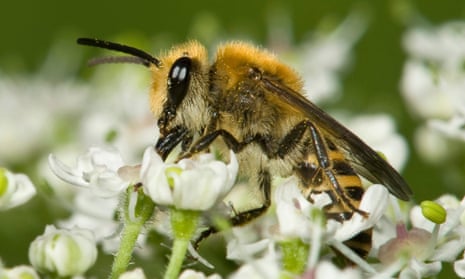The manufacturers of controversial pesticides took part in a key meeting on whether a Europe-wide ban on their chemicals should be lifted in the UK, according to newly published documents. The record of the meeting of the UK government’s expert committee on pesticides (ECP) had previously been suppressed.
Neonicotinoids, the world’s most widely used insecticide, have been linked to serious harm in bees, including a drastic reduction in queens, and were banned across the EU in 2013. Bees and other pollinators are essential for many crops but are in decline due to the impact of pesticides, loss of habitat and disease.
The National Farmers Union (NFU) applied for an “emergency” suspension of the neonicotinoid ban for oil seed rape fields in the UK, which they said were under attack from pests. The newly released record of the meeting on 20 May shows manufacturers Bayer and Syngenta were the only external representatives invited to answer the ECP’s questions.
The NFU initially applied for the ban to be lifted in 79% of all oil seed rape fields, about half a million hectares. But the ECP concluded that “the application was not well evidenced, with weaknesses/uncertainty in referenced data/studies”.
The ECP routinely publishes records of its meeting within three weeks, but on this occasion it was gagged by the Department of Environment, Food and Rural Affairs, who told the ECP it wanted to prevent campaigners lobbying ministers on the issue. The meeting record was only published after a second NFU application, to suspend the neonicotinoid ban for only 5% of oil seed rape fields, was successful.
In another development, Friends of the Earth (FoE) took the first legal step on Tuesday to challenging the ban, which it says appears unlawful. FoE has written a judicial review pre-action letter to environment secretary, Liz Truss, who is the prospective defendant. FoE say that the government failed to supply information it requested on the criteria and process used to suspend the neonicotinoids ban.
“The huge public interest in bee decline and pesticide use contrasts with the government’s excessive secrecy and handling of this decision to let bee-harming pesticides back into our fields this autumn,” said Friends of the Earth’s Paul De Zylva. “Ministers pledged their decisions would be based on science but it has been hard obtaining information, including about the scientific basis, despite repeat requests.”
The record of the 20 May meeting shows Bayer and Syngenta representatives arguing that “79% of the oilseed rape crop was under threat or severe risk from cabbage stem flea beetle and aphids”. The chemical companies also said “the most recent data indicated that 5% of the national crop was lost (or required reseeding or replacement with an alternative crop), compared to 1-1.5% losses in previous years”.
The ECP concluded that there were “probably important localised problems [with pests], but it was difficult to justify [neonicotinoid] use on the wide area suggested by the applicant and that the areas classified as ‘at risk’ or ‘under threat’ were poorly defined”. It rejected the application but promised to provide advice “on how growers could be encouraged to develop more focussed applications as a matter of urgency”.
The ECP said other ways of controlling pests existed: “Using cultural methods, for example sowing at times to avoid peak activity, can be a successful option.” But the ECP added: “This is dependent on a complexity of agronomic, environmental, and practical factors during the season. Hence the requirement of the regulation that there is a ‘danger which cannot be contained by any other reasonable means’ was considered to be fulfilled.”
De Zylva of Friends of the Earth said: “Most revealing is the ECP admission that there has been no progress on helping farmers to produce and protect crops in non-chemical ways. But at least the ECP saw through the NFU’s attempt to drive a coach and horses through the pesticides restriction. Blatant claims of nationwide crop losses due to the lack of pesticide use were unfounded.”
The NFU’s second application, for the much smaller areas, was approved by the ECP at a meeting on 7 July. Unlike the 20 May meeting, no detailed records of the 7 July meeting have been published.
Julian Little, a spokesman for Bayer, said the presence of the company at the ECP meeting was appropriate: “The independent ECP is by definition a collection of experts in their field that come together to give the government advice on pesticide matters, and, as such, can request the presence of anyone at their meetings that they choose. Not surprisingly, as providers of – and therefore experts on – the products for which the emergency use approval was applied, they clearly felt that we were suitable – perhaps the only suitable – people to quiz on the merits of the application and the two products involved.”
A spokesman for Syngenta said: “Syngenta was requested to attend by the ECP in order to respond to technical questions from committee members about our product as they reviewed the NFU’s application.” The spokesman noted that the ECP meeting record states: “The ECP concluded that there is a need to control [cabbage stem flea beetle] and that there were no sustainable alternative plant protection products available, with no other insecticide seed treatments.”
NFU vice president Guy Smith: “The emergency authorisations have been issued and the industry is entitled to proceed according to those authorisations. Damage caused to crops by cabbage stem flea beetle is a widespread problem on a national scale and neonicotinoid seed treatments are vital to provide protection from these pests.”

Comments (…)
Sign in or create your Guardian account to join the discussion